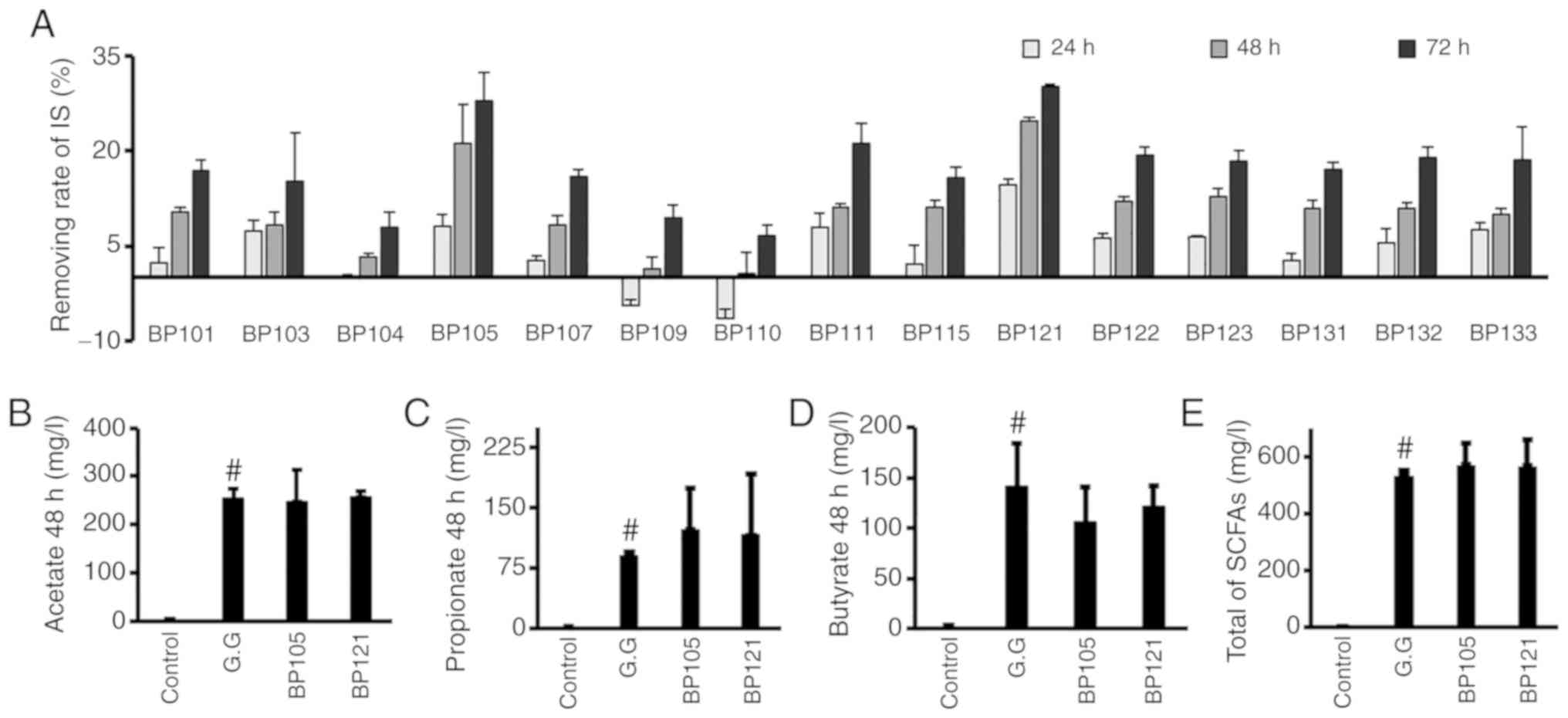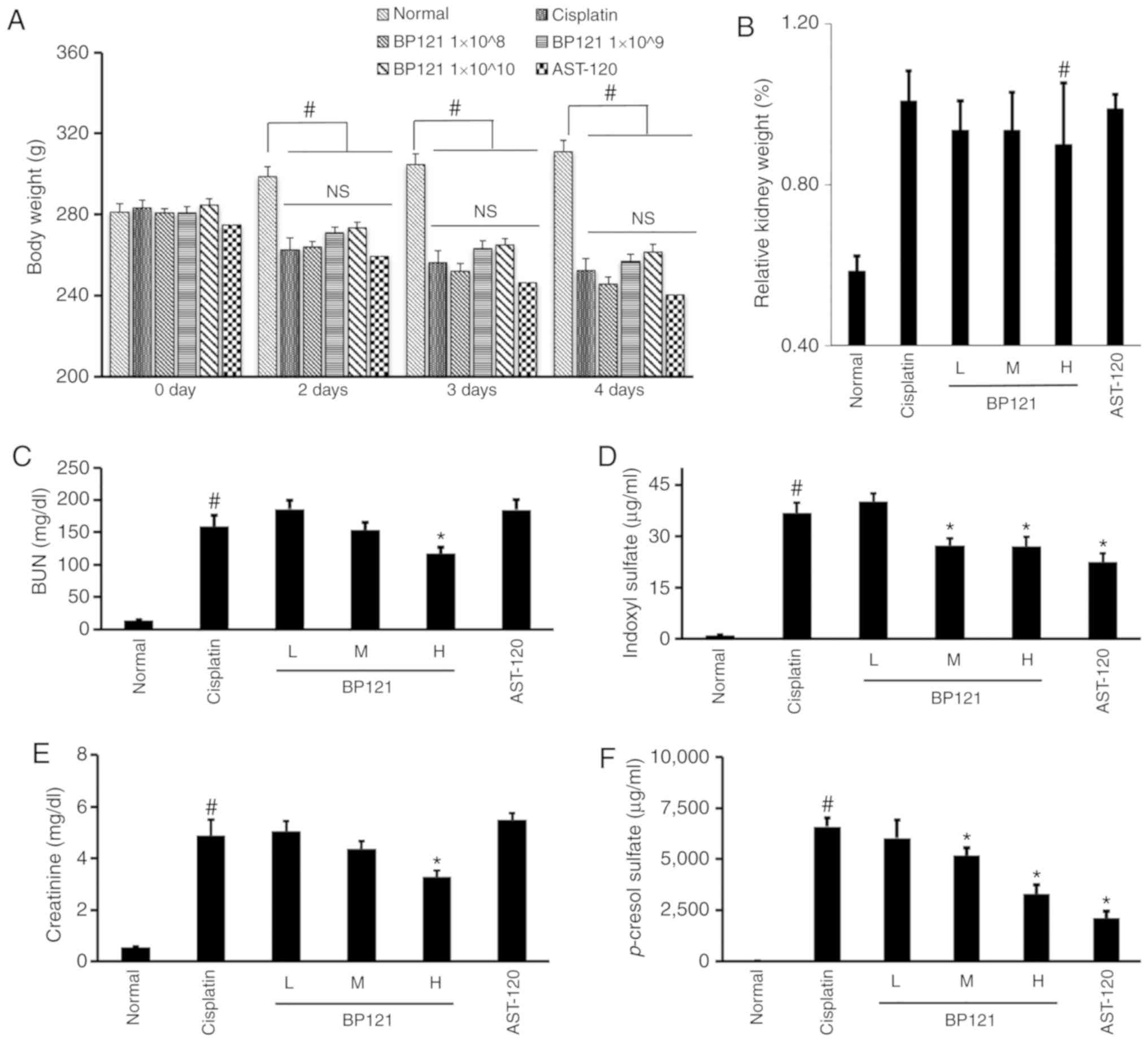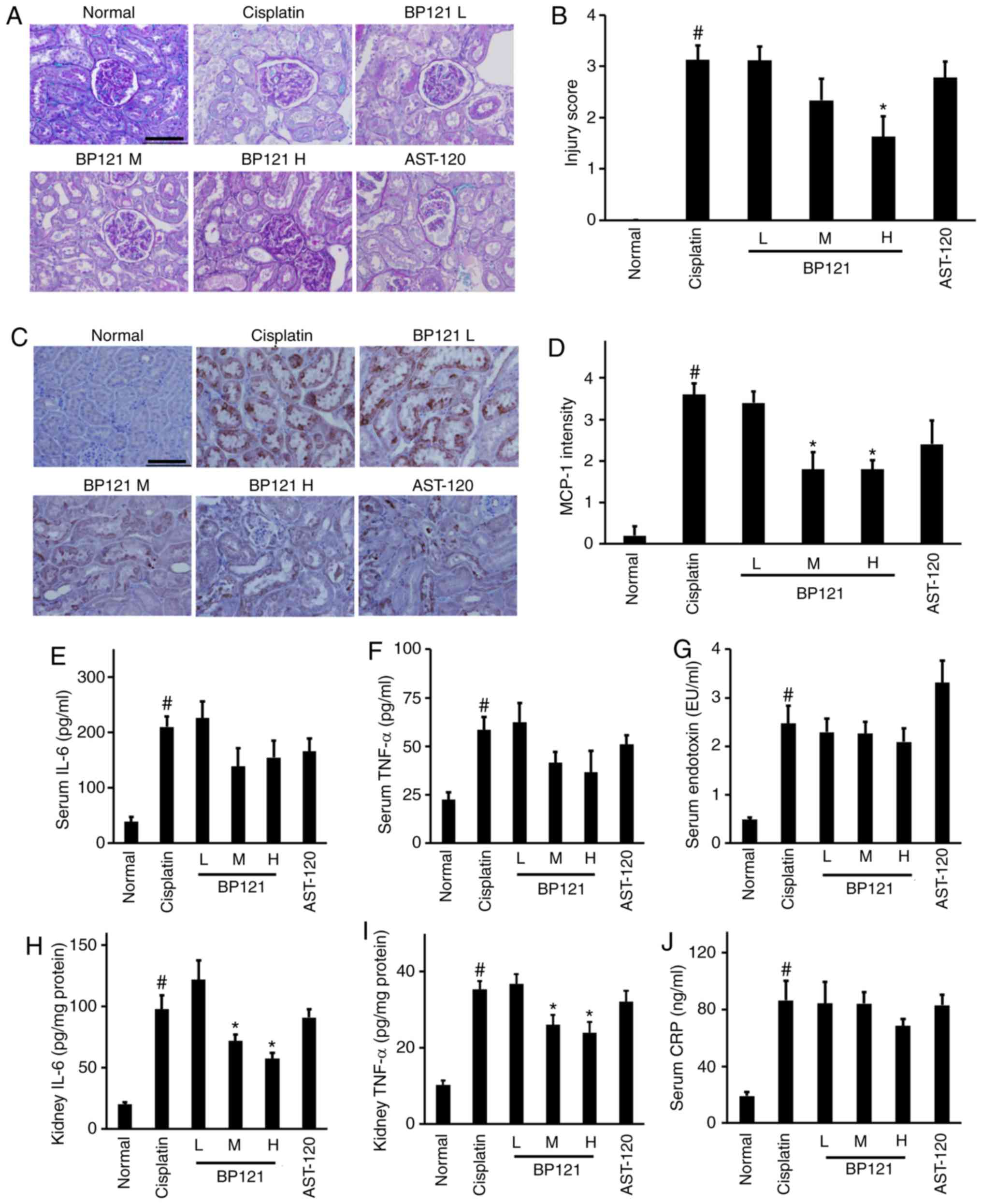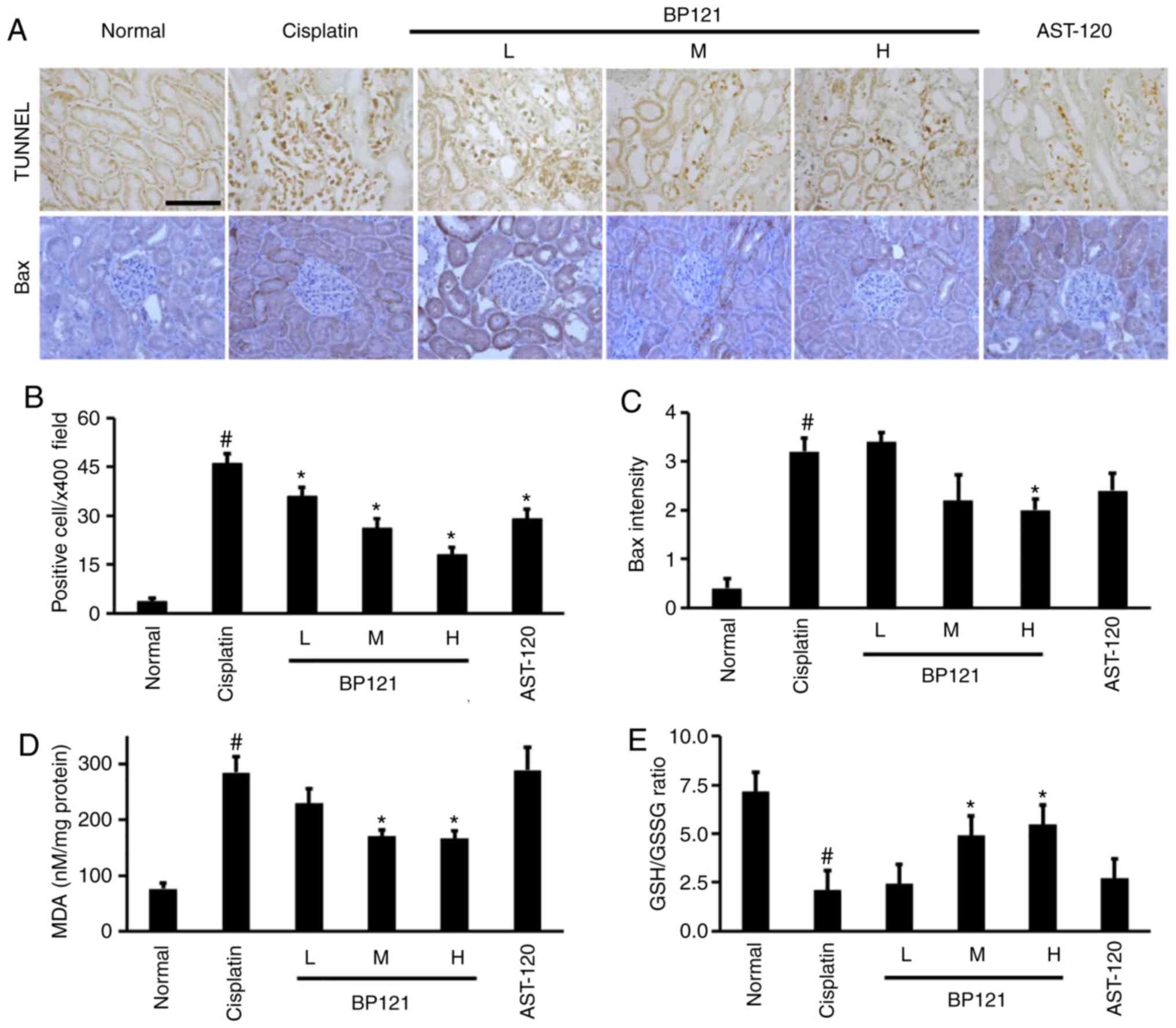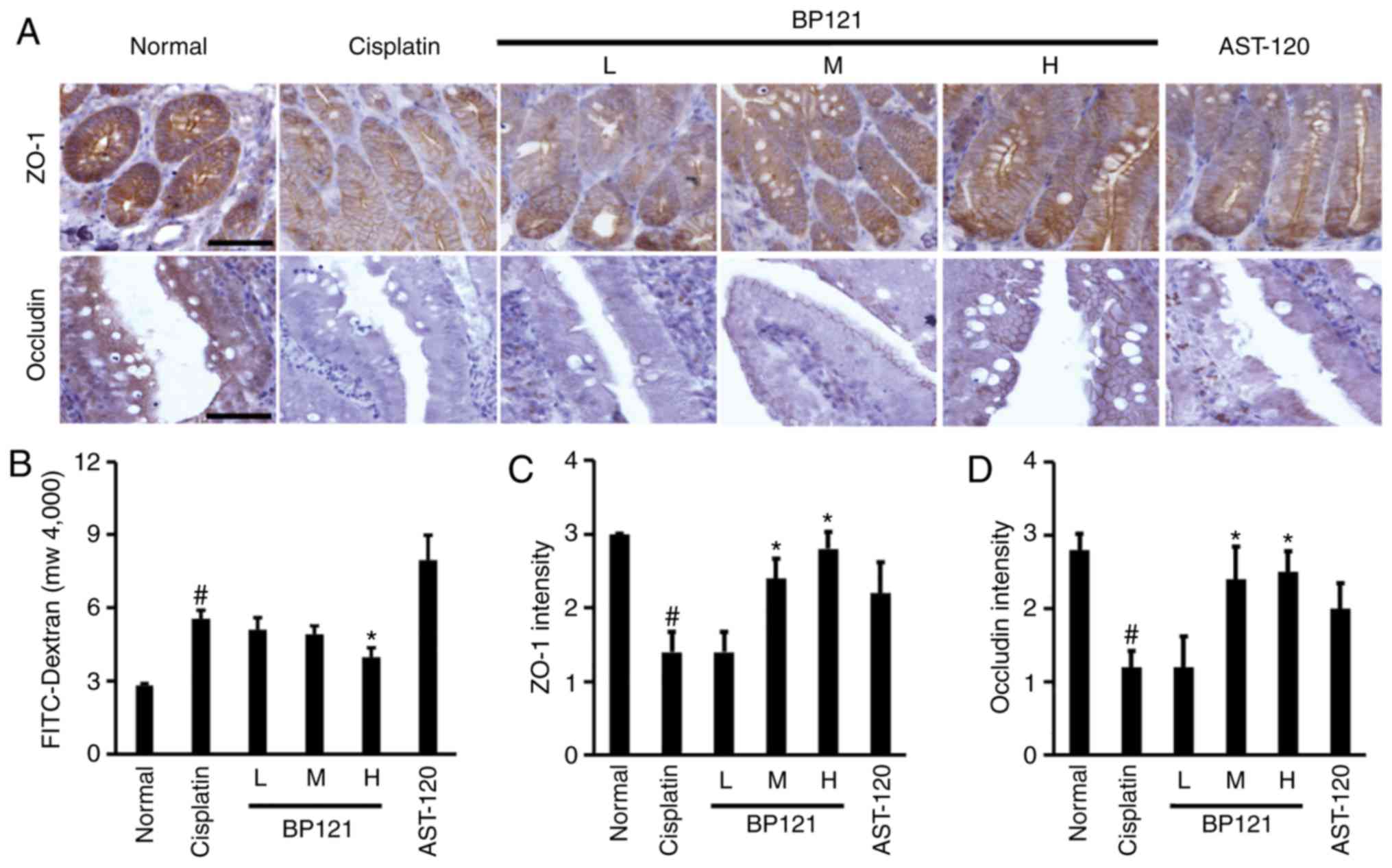|
1
|
Zuk A and Bonventre JV: Acute kidney
injury. Annu Rev Med. 67:293–307. 2016. View Article : Google Scholar : PubMed/NCBI
|
|
2
|
Bellomo R, Kellum JA and Ronco C: Acute
kidney injury. Lancet. 380:756–766. 2012. View Article : Google Scholar : PubMed/NCBI
|
|
3
|
Hsu CY, McCulloch CE, Fan D, Ordonez JD,
Chertow GM and Go AS: Community-based incidence of acute renal
failure. Kidney Int. 72:208–212. 2007. View Article : Google Scholar : PubMed/NCBI
|
|
4
|
Rahman M, Shad F and Smith MC: Acute
kidney injury: A guide to diagnosis and management. Am Fam
Physician. 86:631–639. 2012.PubMed/NCBI
|
|
5
|
Ozkok A and Edelstein CL: Pathophysiology
of cisplatin-induced acute kidney injury. Bio Med Res Int.
2014:9678262014.
|
|
6
|
Chen YY, Chen DQ, Chen L, Liu JR, Vaziri
ND, Guo Y and Zhao YY: Microbiome-metabolome reveals the
contribution of gut-kidney axis on kidney disease. J Transl Med.
17:52019. View Article : Google Scholar : PubMed/NCBI
|
|
7
|
Gong J, Noel S, Pluznick JL, Hamad ARA and
Rabb H: Gut microbiota-kidney cross-talk in acute kidney injury.
Semin Nephrol. 39:107–116. 2019. View Article : Google Scholar : PubMed/NCBI
|
|
8
|
Pabla N and Dong Z: Cisplatin
nephrotoxicity: Mechanisms and renoprotective strategies. Kidney
Int. 73:994–1007. 2008. View Article : Google Scholar : PubMed/NCBI
|
|
9
|
Wang D and Lippard SJ: Cellular processing
of platinum anticancer drugs. Nat Rev Drug Discov. 4:307–320. 2005.
View Article : Google Scholar : PubMed/NCBI
|
|
10
|
Cohen SM and Lippard SJ: Cisplatin: From
DNA damage to cancer chemotherapy. Prog Nucleic Acid Res Mol Biol.
67:93–130. 2001. View Article : Google Scholar : PubMed/NCBI
|
|
11
|
Joyce K, Saxena S, Williams A, Damurjian
C, Auricchio N, Aluotto S, Tynan H and Demain AL: Antimicrobial
spectrum of the antitumor agent, cisplatin. J Antibiot (Tokyo).
63:530–532. 2010. View Article : Google Scholar
|
|
12
|
Taur Y and Pamer EG: Microbiome mediation
of infections in the cancer setting. Genome Med. 8:402016.
View Article : Google Scholar : PubMed/NCBI
|
|
13
|
Andrade-Oliveira V, Amano MT, Correa-Costa
M, Castoldi A, Felizardo RJ, de Almeida DC, Bassi EJ, Moraes-Vieira
PM, Hiyane MI, Rodas AC, et al: Gut bacteria products prevent AKI
induced by ischemia-reperfusion. J Am Soc Nephrol. 26:1877–1888.
2015. View Article : Google Scholar : PubMed/NCBI
|
|
14
|
Barrows IR, Ramezani A and Raj DS: Gut
feeling in AKI: The long arm of short-chain fatty acids. J Am Soc
Nephrol. 26:1755–1757. 2015. View Article : Google Scholar : PubMed/NCBI
|
|
15
|
LeBlanc JG, Chain F, Martín R,
Bermúdez-Humarán LG, Courau S and Langella P: Beneficial effects on
host energy metabolism of short-chain fatty acids and vitamins
produced by commensal and probiotic bacteria. Microb Cell Fact.
16:792017. View Article : Google Scholar : PubMed/NCBI
|
|
16
|
Shimizu J, Kubota T, Takada E, Takai K,
Fujiwara N, Arimitsu N, Murayama MA, Ueda Y, Wakisaka S, Suzuki T
and Suzuki N: Propionate-producing bacteria in the intestine may
associate with skewed responses of IL10-producing regulatory T
cells in patients with relapsing polychondritis. PLoS One.
13:e02036572018. View Article : Google Scholar : PubMed/NCBI
|
|
17
|
Parada Venegas D, De la Fuente MK,
Landskron G, González MJ, Quera R, Dijkstra G, Harmsen HJM, Faber
KN and Hermoso MA: Short chain fatty acids (SCFAs)-mediated gut
epithelial and immune regulation and its relevance for inflammatory
bowel diseases. Front Immunol. 10:2772019. View Article : Google Scholar : PubMed/NCBI
|
|
18
|
Chen T, Kim CY, Kaur A, Lamothe L, Shaikh
M, Keshavarzian A and Hamaker BR: Dietary fibre-based SCFA mixtures
promote both protection and repair of intestinal epithelial barrier
function in a caco-2 cell model. Food Funct. 8:1166–1173. 2017.
View Article : Google Scholar : PubMed/NCBI
|
|
19
|
Diao H, Jiao AR, Yu B, Mao XB and Chen DW:
Gastric infusion of short-chain fatty acids can improve intestinal
barrier function in weaned piglets. Genes Nutr. 14:42019.
View Article : Google Scholar : PubMed/NCBI
|
|
20
|
Meimandipour A, Hair-Bejo M, Shuhaimi M,
Azhar K, Soleimani AF, Rasti B and Yazid AM: Gastrointestinal tract
morphological alteration by unpleasant physical treatment and
modulating role of lactobacillus in broilers. Br Poult Sci.
51:52–59. 2010. View Article : Google Scholar : PubMed/NCBI
|
|
21
|
Fujii H, Nishijima F, Goto S, Sugano M,
Yamato H, Kitazawa R, Kitazawa S and Fukagawa M: Oral charcoal
adsorbent (AST-120) prevents progression of cardiac damage in
chronic kidney disease through suppression of oxidative stress.
Nephrol Dial Transplant. 24:2089–2095. 2009. View Article : Google Scholar : PubMed/NCBI
|
|
22
|
Wang CY, Lin PR, Ng CC and Shyu YT:
Probiotics properties of lactobacillus strains isolated from the
feces of breast-fed infants and Taiwanese pickled cabbage.
Anaerobe. 16:578–585. 2010. View Article : Google Scholar : PubMed/NCBI
|
|
23
|
Fang CY, Lu JR, Chen BJ, Wu C, Chen YP and
Chen MJ: Selection of uremic toxin-reducing probiotics in vitro and
in vivo. J Funct Foods. 7:407–415. 2014. View Article : Google Scholar
|
|
24
|
McDonald JW and Pilgram TK: Nuclear
expression of p53, p21 and cyclin D1 is increased in
bronchioloalveolar carcinoma. Histopathology. 34:439–446. 1999.
View Article : Google Scholar : PubMed/NCBI
|
|
25
|
Pagliari D, Piccirillo CA, Larbi A and
Cianci R: The interactions between innate immunity and microbiota
in gastrointestinal diseases. J Immunol Res. 2015:8982972015.
View Article : Google Scholar : PubMed/NCBI
|
|
26
|
Ley RE, Turnbaugh PJ, Klein S and Gordon
JI: Microbial ecology: Human gut microbes associated with obesity.
Nature. 444:1022–1023. 2006. View Article : Google Scholar : PubMed/NCBI
|
|
27
|
Turnbaugh PJ and Gordon JI: The core gut
microbiome, energy balance and obesity. J Physiol. 587:4153–4158.
2009. View Article : Google Scholar : PubMed/NCBI
|
|
28
|
Wang Y, Hoenig JD, Malin KJ, Qamar S,
Petrof EO, Sun J, Antonopoulos DA, Chang EB and Claud EC: 16S rRNA
gene-based analysis of fecal microbiota from preterm infants with
and without necrotizing enterocolitis. ISME J. 3:944–954. 2009.
View Article : Google Scholar : PubMed/NCBI
|
|
29
|
Jeffery IB, O'Toole PW, Öhman L, Clasesson
MJ, Deane J, Quigley EM and Simre'n M: An irritable bowel syndrome
subtype defined by species-specific alterations in faecal
microbiota. Gut. 61:997–1006. 2012. View Article : Google Scholar
|
|
30
|
Barrett E, Hayes M, O'Connor P, Gardiner
G, Fitzgerald GF, Stanton C and Hill C: Salivaricin P: One of a
family of two-component antilisterial bacteriocins produced by
intestinal isolates of Lactobacillus salivarius. Appl Environ
Microbiol. 73:3719–3723. 2007. View Article : Google Scholar : PubMed/NCBI
|
|
31
|
Giongo A, Gano KA, Crabb DB, Mukherjee N,
Novelo LL, Casella G, Drew JC, Ilonen J, Knip M, Hyöty H, et al:
Toward defining the autoimmune microbiome for type 1 diabetes. ISME
J. 5:82–91. 2011. View Article : Google Scholar :
|
|
32
|
Ley RE, Peterson DA and Gordon JI:
Ecological and evolutionary forces shaping microbial diversity in
the human intestine. Cell. 124:837–848. 2006. View Article : Google Scholar : PubMed/NCBI
|
|
33
|
Wells JM, Rossi O, Meijerink M and van
Baarlen P: Epithelial crosstalk at the microbiota-mucosal
interface. Proc Natl Acad Sci USA. 108(Suppl 1): 4607–4614. 2011.
View Article : Google Scholar
|
|
34
|
Bryniarski MA, Hamarneh F and Yacoub R:
The role of chronic kidney disease-associated dysbiosis in
cardiovascular disease. Exp Biol Med (Maywood). 244:514–525. 2019.
View Article : Google Scholar
|
|
35
|
Karczewski J, Troost FJ, Konings I, Dekker
J, Kleerebezem M, Brummer RJM and Wells JM: Regulation of human
epithelial tight junction proteins by Lactobacillus plantarum in
vivo and protective effects on the epithelial barrier. Am J Physiol
Gastrointest Liver Physiol. 298:G851–G859. 2010. View Article : Google Scholar : PubMed/NCBI
|
|
36
|
Vaziri ND: CKD impairs barrier function
and alters microbial flora of the intestine: A major link to
inflammation and uremic toxicity. Curr Opin Nephrol Hypertens.
21:587–592. 2012. View Article : Google Scholar : PubMed/NCBI
|
|
37
|
Mariadason JM, Barkla DH and Gibson PR:
Effect of short-chain fatty acids on paracellular permeability in
Caco-2 intestinal epithelium model. Am J Physiol. 272:G705–G712.
1997.PubMed/NCBI
|
|
38
|
Kendle M and Maslowski: The role of GPR43
in the immune system: A novel connection between diet, gut
microbiota and immune function. University of New South Wales;
Sydney: 2013
|
|
39
|
Nyman M: Fermentation and bulking capacity
of indigestible carbohydrates: The case of inulin and
oligofructose. Br J Nutr. 87(Suppl 2): 163–168. 2002. View Article : Google Scholar
|
|
40
|
Kotzampassi K, Giamarellos-Bourboulis EJ
and Stavrou G: Obesity as a consequence of gut bacteria and diet
interactions. ISRN Obes. 2014:6518952014.PubMed/NCBI
|
|
41
|
Wong JM, de Souza R, Kendall CW, Emam A
and Jenkins DJ: Colonic health: Fermentation and short chain fatty
acids. J Clin Gastroenterol. 40:235–243. 2006. View Article : Google Scholar : PubMed/NCBI
|
|
42
|
Pomare EW, Branch WJ and Cummings JH:
Carbohydrate fermentation in the human colon and its relation to
acetate concentrations in venous blood. J Clin Invest.
75:1448–1454. 1985. View Article : Google Scholar : PubMed/NCBI
|
|
43
|
Kim MH, Kang SG, Park JH, Yanagisawa M and
Kim CH: Short-chain fatty acids activate GPR41 and GPR43 on
intestinal epithelial cells to promote inflammatory responses in
mice. Gastroenterology. 145:396–406. 2013. View Article : Google Scholar : PubMed/NCBI
|
|
44
|
Tedelind S, Westberg F, Kjerrulf M and
Vidal A: Anti-inflammatory properties of the short-chain fatty
acids acetate and propionate: A study with relevance to
inflammatory bowel disease. World J Gastroenterol. 13:2826–2832.
2007. View Article : Google Scholar : PubMed/NCBI
|
|
45
|
Liu T, Li J, Liu Y, Xiao N, Suo H, Xie K,
Yang C and Wu C: Short-chain fatty acids suppress
lipopolysaccharide-induced production of nitric oxide and
proinflammatory cytokines through inhibition of NF-κB pathway in
RAW264.7 cells. Inflammation. 35:1676–1684. 2012. View Article : Google Scholar : PubMed/NCBI
|
|
46
|
Tazoe H, Otomo Y, Karaki S, Kato I, Fukami
Y, Terasaki M and Kuwahara A: Expression of short-chain fatty acid
receptor GPR41 in the human colon. Biomed Res. 30:149–156. 2009.
View Article : Google Scholar : PubMed/NCBI
|
|
47
|
Wang Y, Wu Y, Wang Y, Xu H, Mei X, Yu D
and Li W: Antioxidant properties of probiotic bacteria. Nutrients.
9:521–535. 2017. View Article : Google Scholar :
|
|
48
|
Mishra V, Shah C, Mokashe N, Chavan R,
Yadav H and Prajapati J: Probiotics as potential antioxidants: A
systematic review. J Agric Food Chem. 63:3615–3626. 2015.
View Article : Google Scholar : PubMed/NCBI
|
|
49
|
Baek SM, Kwon CH, Kim JH, Woo JS, Jung JS
and Kim YK: Differential roles of hydrogen peroxide and hydroxyl
radical in cisplatin-induced cell death in renal proximal tubular
epithelial cells. J Lab Clin Med. 142:178–186. 2003. View Article : Google Scholar : PubMed/NCBI
|
|
50
|
Meijers BK and Evenepoel P: The gut-kidney
axis: Indoxyl sulfate, p-cresyl sulfate and CKD progression.
Nephrol Dial Transplant. 26:759–761. 2011. View Article : Google Scholar : PubMed/NCBI
|
|
51
|
Jourde-Chiche N, Dou L, Cerini C,
Dignat-George F, Vanholder R and Brunet P: Protein-bound
toxins-update 2009. Semin Dial. 22:334–339. 2009. View Article : Google Scholar : PubMed/NCBI
|
|
52
|
Ramezani A and Raj DS: The gut microbiome,
kidney disease, and targeted interventions. J Am Soc Nephrol.
25:657–670. 2014. View Article : Google Scholar :
|
|
53
|
Yoshifuji A, Wakino S, Irie J, Tajima T,
Hasegawa K, Kanda T, Tokuyama H, Hayashi K and Itoh H: Gut
Lactobacillus protects against the progression of renal damage by
modulating the gut environment in rats. Nephrol Dial Transplant.
31:401–412. 2015. View Article : Google Scholar : PubMed/NCBI
|
















